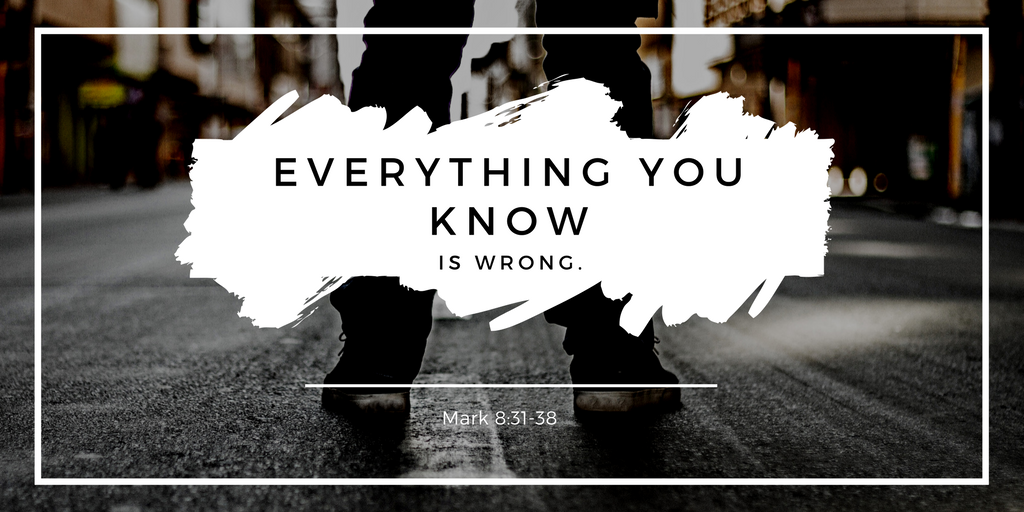 It became obvious at about 5 minutes to 6:00 last Sunday night that I had grossly underestimated the number of people who would want to begin Lent by listening to the whole Gospel of Mark over a silent meal. As we were setting up an extra bank of chairs in the back, I thought, well, this is a great problem to have. Plus, it kind of put us in first-century mode: crammed into a small space, focusing hard to hear as God’s word was read aloud to us. It’s how these texts were meant to be encountered, how the authors of the New Testament assumed people would receive them: heard, not read, and all together in community. I loved the comments afterwards – everyone sharing what stood out to them, like the sense of urgency, the concrete event-orientation, the repeated clashes with the demonic, the ratcheting up of conflict with the authorities, and the very abrupt ending. Those things are all key to Mark’s strategy for bringing across the good news of Jesus, but we don’t tend to notice them if the only way we encounter the Bible is as brief excerpts served up when we come to church. If you ever want to have a relationship with Scripture that will make a difference in your life, you have to take in more than snippets. We ate using placemats with a visual map of how the Gospel of Mark is organized; you can pick up an extra copy in the Great Hall. And since all of us using the parish Lenten guidebook will be reading Mark daily until the Triduum, I thought I’d comment quickly on what that map looks like. We can see three sections in the Gospel of Mark: the first part is in Galilee, the last part is in Jerusalem, and there’s a short entr’acte (if you will) set on the way between them.
0 Comments
To ask why we do Lent is to ask why Jesus was driven into the wilderness.
With Lent, we know that Easter comes next, so couldn’t we just skip right to it? In a certain sense, we could, because that’s what a lot of people do already. But of course the answer is no because Jesus didn’t skip right to it. And even if we were to go straight to Easter, we’d still have to ask why Jesus was crucified in order to die the death that was necessary for the resurrection in the first place. If not Lent, then Good Friday. With Jesus’ time in the wilderness, we know that he was baptized just before and declared to be the Beloved Son in whom the Father is well pleased. Hardly the kind of event that sends you off by your lonesome -- “Happy Birthday! Now go to your room.” Indeed, the passage would run pretty seamlessly if the whole bit about the wilderness were redacted entirely. If it went straight from “You are my Son, the Beloved, in whom I am well pleased” to “Jesus came to Galilee, proclaiming the good news of God.”  The Lutheran pastor Nadia Bolz-Weber points out something interesting about today. She notes that our post-Christian culture has appropriated Christmas with great success and Easter with moderate success. We’ve got the Elf on the Shelf and the Easter Bunny and seasonal sweatshirts and made for TV shows. But, as she says, “oddly nobody waits every year to watch the Ash Wednesday Peanuts Special.” There were no 4am mobs at Best Buy this morning fighting to grab the very best Lenten Doorbusters. “Nope. We get this one all to ourselves. Our culture has no idea what to do with a day that [majors on] the fact that we all sin and are [all] going to die.” Lent is just too realistic for cultural appropriation, isn’t it? Nostalgia and wish-fulfillment can always draw a crowd, but what we have on offer this Ash Wednesday is neither. It’s the sober truth that human beings are turned so deeply to self-interest that we cannot set ourselves free, along with the equally sober truth that the consequences of that inward bias is chaos and mortality, along with the still sober yet wondrous truth that God in Christ has acted definitively to rescue us from our bondage. Ash Wednesday is bad news and good news. It won’t help sell products. But it’s real. Bolz-Weber goes on, “There’s no shame in the truth that our lives on earth will all end and that we are in bondage to sin and cannot free ourselves. [That’s] not depressing. What’s depressing is the desperation of trying to pretend otherwise. What’s depressing is to insist that I can free myself; I just haven’t managed to pull it off yet. What is so wonderful about Ash Wednesday and Lent is that through being marked with the cross and reminded of our own mortality, we are free. We are free to hear the song of our own salvation which tells of Christ who offers life and forgiveness.”  The season after Epiphany always appropriately features a series of epiphanies. Epiphany is the name of a holy day, but it’s also a word that means manifestation. So a series of manifestations of God have been included in this season, which concludes this week. Apart from the actual day of Epiphany itself, the first time Jesus was revealed to any non-Jews, there are three particular manifestations that are classically associated with this time of year. The first of them is the Baptism of Christ, the second is the miracle of his turning water into wine at Cana, and the third is the capper, the one we always read the last Sunday before Ash Wednesday, the Transfiguration. (You’ll note that our closing hymn today gives a nod to all three.) In this fascinating reading, Jesus has brought Peter, James, and John with him up to the summit of a mountain, and as they look at Jesus they begin to see his glory. His clothes shine like blinding sun reflecting off white snow. But that’s not all: two of the greatest heroes of their Jewish faith, Elijah and Moses, appear out of nowhere. Finally a cloud swallows their entire field of vision, they hear the very voice of God telling them that the One to listen to is Jesus, his beloved Son -- and then it’s over. When they head back, shellshocked, down the mountain, Jesus starts talking, and he’s talking about dying. He also mentions rising from the dead, but they can’t even process that. It says in the next verse after our reading ended today, “they kept the matter to themselves, questioning what this rising from the dead might mean.” As well they might. “Now Simon’s mother-in-law was in bed with a fever, and they told him about her at once.”
“At once”, “immediately”, are phrases that occur often in the gospel of Mark. Today’s passage contains many of the themes found in Mark, and I will look at these specific verses more fully in a bit. First though, I want to mention an opportunity that will be coming up during Lent at Emmanuel this year. Here is some background. Twice a year the clergy of this diocese come together to worship, reflect and learn. Often one of the gatherings follows a retreat schedule with periods of silent reflection while the other is more of a learning conference. At this past November meeting, since this is year B in the lectionary, we experienced more about the gospel of Mark. The first evening of the conference was a solo performance by an actor from New York City, Tom Bair. (Tom is also a clergy spouse, the husband of Bishop Geralyn Wolf.) Tom has memorized the gospel of Mark, the King James Version, and this is what he did for us. He recited the entire gospel from memory, with only one short intermission. Now to be honest with you, after a three hour afternoon drive and a somewhat heavy supper, I thought I would have to really work to stay awake. Not so! |
Archives
July 2024
Categories |

 RSS Feed
RSS Feed